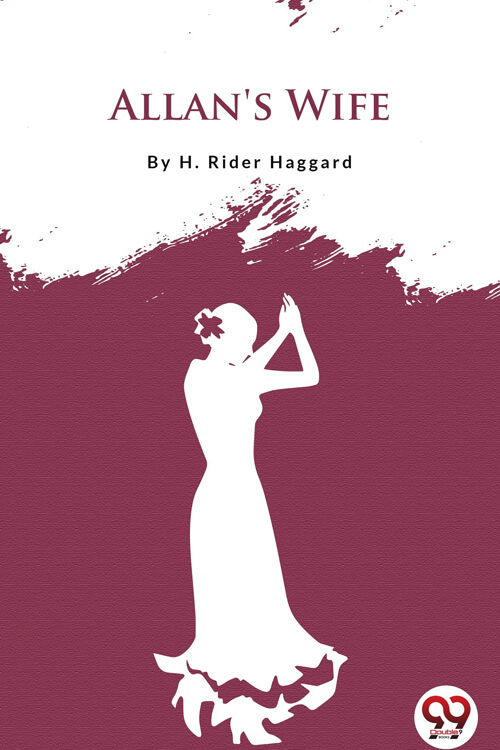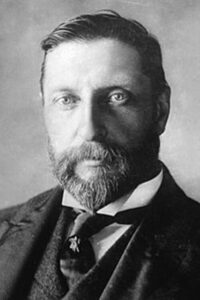
Allan’s Wife
It may be remembered that in the last pages of his diary, written just before his death, Allan Quatermain alludes to his long-dead wife, stating that he has written of her fully elsewhere.
When his death was known, his papers were handed to me as his literary executor. Among them, I found two manuscripts, of which the following is one. The other is simply a record of events wherein Mr. Quatermain was not personally concerned—a Zulu novel, the story of which was told to him by the hero many years after the tragedy had occurred. But with this, we have nothing to do at present.
I have often thought (Mr. Quatermain’s manuscript begins) that I would set down on paper the events connected with my marriage, and the loss of my most dear wife. Many years have now passed since that event, and to some extent, time has softened the old grief, though Heaven knows it is still keen enough. On two or three occasions I have even begun the record.
Once I gave it up because the writing of it depressed me beyond bearing, once because I was suddenly called away upon a journey, and the third time because a Kaffir boy found my manuscript convenient for lighting the kitchen fire.
But now that I am at leisure here in England, I will make a fourth attempt. If I succeed, the story may serve to interest someone in after years when I am dead and gone; before that, I should not wish it to be published. It is a wild tale enough and suggests some curious reflections.
I am the son of a missionary. My father was originally curate in charge of a small parish in Oxfordshire. He had already been some ten years married to my dear mother when he went there, and he had four children, of whom I was the youngest. I remember faintly the place where we lived. It was an ancient long grey house, facing the road. There was a very large tree of some sort in the garden. It was hollow, and we children used to play about inside of it and knock knots of wood from the rough bark. We all slept in a kind of attic, and my mother always came and kissed us when we were in bed. I used to wake up and see her bending over me, a candle in her hand. There was a curious kind of pole projecting from the wall over my bed. Once I was dreadfully frightened because my eldest brother made me hang to it by my hands. That is all I remember about our old home. It has been pulled down long ago, or I would journey there to see it.
Read or download Book
H. Rider Haggard
Sir Henry Rider Haggard KBE (22 June 1856 – 14 May 1925) was an English writer of adventure fiction romances set in exotic locations, predominantly Africa, and a pioneer of the lost world literary genre. He was also involved in land reform throughout the British Empire. His stories, situated at the lighter end of Victorian literature, continue to be popular and influential.
Life and career
Family
Henry Rider Haggard, generally known as H. Rider Haggard or Rider Haggard, was born at Bradenham, Norfolk, the eighth of ten children, to William Meybohm Rider Haggard, a barrister, and Ella Doveton, an author and poet. His father was born in Saint Petersburg, Russia, in 1817 to British parents.
A member of the Haggard family, he was the great-nephew of the ecclesiastical lawyer John Haggard an uncle of the naval officer Admiral Sir Vernon Haggard and the diplomat Sir Godfrey Haggard.
Education
Haggard was initially sent to Garsington Rectory in Oxfordshire to study under Reverend H. J. Graham, but, unlike his elder brothers, who graduated from various private schools, he attended Ipswich Grammar School. This was because his father, who perhaps regarded him as somebody who was not going to amount to much, could no longer afford to maintain his expensive private education. After failing his army entrance exam, he was sent to a private crammer in London to prepare for the entrance exam for the British Foreign Office, where he never sat. During his two years in London, he came into contact with people interested in the study of psychic phenomena.
Writing career
After returning to England in 1882, Haggard published a book on the political situation in South Africa, as well as a handful of unsuccessful novels, before writing the book for which he is most famous, King Solomon’s Mines. He accepted a 10 percent royalty rather than £100 for the copyright.
A sequel soon followed entitled Allan Quatermain, followed by She and its sequel Ayesha, swashbuckling adventure novels set in the context of the Scramble for Africa (although the action of Ayesha happens in Tibet). The hugely popular King Solomon’s Mines is sometimes considered the first of the Lost World genre. She is generally considered to be one of the classics of imaginative literature, and with 83 million copies sold by 1965, it is one of the best-selling books in history. He is also remembered for Nada the Lily (a tale of adventure among the Zulus) and the epic Viking romance, Eric Brighteyes.
Legacy
Psychoanalyst Carl Jung considered Ayesha, the female protagonist of She, to be a manifestation of the anima. Her epithet “She Who Must Be Obeyed” is used by British author John Mortimer in his Rumpole of the Bailey series as the lead character’s private name for his wife, Hilda, before whom he trembles at home (even though he is a barrister with some skill in court). Haggard’s Lost World genre influenced popular American pulp writers such as Edgar Rice Burroughs, Robert E. Howard, Talbot Mundy, Philip José Farmer, and Abraham Merritt. Allan Quatermain, the adventure hero of King Solomon’s Mines and its sequel Allan Quatermain, was a template for the American character Indiana Jones. Quatermain has gained recent popularity thanks to being a main character in the League of Extraordinary Gentlemen.
Graham Greene, in an essay about Haggard, stated, “Enchantment is just what this writer exercised; he fixed pictures in our minds that thirty years have been unable to wear away.” Haggard was praised in 1965 by Roger Lancelyn Green, one of the Oxford Inklings, as a writer of a consistently high level of “literary skill and sheer imaginative power” and a co-originator with Robert Louis Stevenson of the Age of the Story Tellers.






